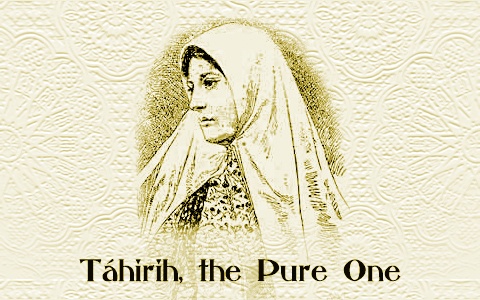 |
 |
|
PART SIX July 29, 2019 THE PURE ONE The storm clouds were gathering and, fingering her beautiful silk handkerchief, the one she had long known would be wound about her throat – not with tender care but with violence – Táhirih prayed and fasted surrounded by myriad candles as she spiritually prepared for her reunion with her Beloved, the One she would meet for the very first time in the next world.  How many names had Táhirih borne in her short life, how many boundaries had she crossed that were forbidden to women, how many souls did she set afire with love for her Beloved! Born Fátimih Baraghaní in Qazvín, Persia, the daughter of a mujtahid, a scholar of Islamic law, now she stood in her room in the mayor of Tehrán’s house, a respected prisoner for over four years. While the mayor’s wife was weeping the upcoming loss of her dear friend, the mayor’s son was waiting to take her to the planned site of her martyrdom, having promised to ensure that she was neither molested nor forced to remove her clothes. Who was this remarkable woman? Although she had been raised in the shadows of her home, unable to be seen unveiled by men other than her male relatives, her indulgent father, Haji Mullá Salih had allowed her to be educated by a tutor. Beautiful and brilliant and known as Zarrin-Taj, meaning “crowned in gold,” she surpassed her brothers in her studies, prompting her father to say, “Would that she had been a boy, for then he would have shed illumination upon my household and would have succeeded me.” She was even permitted to attend her father’s lectures from behind a curtain. Her reputation as a fine poet had also won her renown. An avid reader, one fateful day she visited her cousin Mulla Javád, and while perusing his library, she came across some of Shaykh Ahmad and Siyyid Kázim’s writings. Delighted by what she read, she asked her cousin to send her these books. He refused, stating that her father would be greatly displeased if he found these books in her possession. “I have searched many a long year for the truth. Send me these books, I will take care of my father.” Not only did she openly read these books, she argued their contents with her father, who only ridiculed her nascent beliefs. Determined to know more, she wrote a paper in support of Shaykhí teachings and sent them to Siyyid Kázim himself. They soon embarked on a secret correspondence, and Siyyid Kázim, touched by her devotion and intelligence, wrote her back, addressing her thus: “O you, who are the solace of my eyes…” Now she had become Qurratu’l-Ayn, the Solace of the Eyes.” Determined to attend his lectures, she accomplished this goal by receiving permission to visit the famous shrines in Karbilá. When she arrived, however, she discovered that Siyyid Kázim had passed away ten days before, leaving her heartbroken. However, she had remained and attended classes, even giving a few of her own – from behind a curtain, of course. One night, following a period of fasting and prayer in which she too longed to discover who the Promised One might be, she dreamt that she saw a young man floating in the heavens, His face shining like a noonday sun, His arms raised in prayer. He wore a long black coat and the green turban of a siyyid. Words were flowing like a river from His lips and, catching a portion of these words, when Qurratu’l-Ayn awoke, suffused with joy, she wrote them down immediately. When she received a copy of the Báb’s tablet on the Surih of Joseph He had revealed for Mullá Husayn and reading the very words she had dreamt, she knew she had found her Beloved at last. Upon learning that her cousin, Muhammad-‘Alí-i-Qazvíní had also accepted the Báb and was preparing to visit Him, she handed him a letter to give to the Báb, adding: “Say to Him from me: “The effulgence of Your face arose on high. Then speak the words ‘Am I not your Lord? And ‘You are, You are, we will all reply!’” Muhammad-‘Alí became the 16th Letter of the Living and she was named the 17th Letter of the Living, the only woman in that exalted company of souls. One of the first women to accept the Báb as a result of her teaching efforts was none other than Siyyid Kázim’s wife, who loved Qurratu’l-‘Ayn as a dear friend. Other stellar women joined her, such as Mullá Husayn’s mother and sister, and her close companion, Shams-i-Duhá. These ladies were humble but ardent and knowledgeable teachers of the Faith.
|
|
|